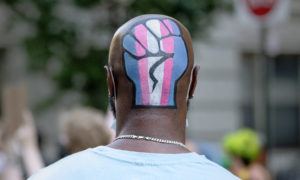In her eight years as Scotland’s First Minister, Nicola Sturgeon has revealed herself to be addicted to, and adept at, Manichaean practices: the use, developed by the devotees of the prophet Mani in the later Roman empire, of a cosmology which divides people, events and the world itself into, on the one side, luminous spirituality and goodness and, on the other, a tenebrous state of wickedness.
In Sturgeon’s rhetoric, the former is the SNP itself, its policies for governing and its goal of national independence. All democratic politics partake, necessarily, of some of Mani’s drear religion, but Sturgeon has made it the brand of her party and her leadership, underpinned by the constant grievance that Scotland remains held — after centuries — in servile chains.
Every SNP minister and senior official must display their versions of this: the head Manichee, example to them all, is Sturgeon. And in the matter of the Gender Recognition Recognition Bill — which would allow children of 16 to change their gender, independently of their parents’ consent — she deploys its mechanisms with practised skill.
In a speech just before the Bill came to Holyrood, she said she would “never apologise for trying to spread equality”, that the Bill would cut away the “intrusive, traumatic, dehumanising” barriers to transition, and, with the Vox Humana in full flow, that she bore an important responsibility “to make life a little better for the stigmatised minorities”. This is luminous goodness — government as Good Samaritan.
And yet, the opposing forces, evil as they might be, have put down some markers which could cause the less enlightened to pause. London’s Tavistock Clinic, home to England’s Gender Identity Development Service (Gids), became increasingly beset with complaints and controversy. Last summer, it was closed. Scotland has its own Gids centre: the Sandyford Clinic, in Glasgow. It, too, began to receive a growing list of complaints. Last September, Sinéad Watson, who started to identify as a man aged 20, and who had been prescribed testosterone treatments and had a double mastectomy, told UnHerd that she bitterly regrets it, and called for Sandyford to be closed.
The procedures and overall approaches at the Tavistock and Sandyford are not of liberation and joy, but of young men and women inadequately advised by clinicians who were, as one report noted, more concerned with “putting them quickly onto a pathway to transition”. These considerations closed the Tavistock Gids and now threaten Sandyford: they also inform the decision of the UK Government to animate a Section 35 Order under the 1998 Scotland Act — the legal basis for the Scottish parliament — which has, for the present, stymied the Scots nationalists’ momentum.
In response, the SNP has mounted a grand operatic display of outrage. This was “an unprecedented attack on the Scottish parliament”, its Westminster spokesperson warned. For Sturgeon, it amounted to “a full-frontal attack on our democratically elected Scottish Parliament”. There is no denying the importance of this matter: it has elevated what was largely a political manoeuvre of little general concern into a moral issue that illuminates not just the proper age at which life-changing decisions may be taken, but the very nature of parental responsibility.
Those opposed to the legislation have also stressed the possible threat to women. Johann Lamont, a former Labour member of the Scottish parliament and briefly the leader of the party in Scotland, described in the Sunday Post how she found it “hard to believe anyone really thinks that it’s a good idea to have a convicted male sex offender in a women’s jail”. Reflecting on the consequences of the vote, she added: “the Labour Party manifesto is full of commitments around issues like single-sex spaces and understanding women’s health. But if you have dismantled what the difference between male and female is, how do you even begin to meet those commitments?”
Last year, her national leader, Sir Keir Starmer, struggled to address this theme on a LBC phone-in: when asked if a woman could have a penis, he replied hesitantly that he didn’t think “discussing this issue in this way helps anyone”. But Starmer is on Lamont’s side now: he won’t — as most Labour MSPs did — support Scotland’s Bill: “I have concerns about the provision in Scotland, in particular the age reduction to 16 and in particular the rejection of our amendment in relation to the Equalities Act.” Pressed by Laura Kuenssberg on whether he thinks someone of 16 is old enough to decide to change their gender, he replied: “No, I don’t think you are.” In this, Starmer puts himself on the same footing as the UK Equalities Minister, Kemi Badenoch, who argued that it was “not possible” for the legislation to be “fully contained” within Scotland, since it could contradict parts of the 2010 Equalities Act.
The Labour split on this is deep. Where a few in Scotland took the Starmer-Lamont line, more appear to have been convinced that the progressive stance is to stand with the SNP. Labour put up a number of amendments to the Bill’s clauses, but all were rejected. Even so, rather than take the obvious course of abstaining or even opposing on the basis that the legislation is flawed, most voted yes. Kezia Dugdale, herself also a former Labour Party leader, celebrated the SNP Bill, saying, in a style similar to Sturgeon’s, that “this bill will become law this week not because women were silenced but because many female proponents of it refused to be”. Scotland’s current Labour leader, Anas Sarwar, yesterday agreed that the UK Government was “wrong”.
If the controversy continues and deepens, as seems likely, this may affect a future election: at the very least, it shows that many Labour MSPs and supporters are closer to nationalist than centrist Labour thinking — a political gift to Sturgeon.
But will it be enough? Perhaps the largest prick to the balloon of righteousness, curiously little referred to, is the SNP project’s unpopularity. Recent polls reported in The Times suggest 62% do not support age-reduction decisions from 18 to 16, while only 19% support them. The proposed cut in the waiting period before a new gender is recognised — from two years to three months — is opposed by 50% and approved by 25%. Ending the need for a medical diagnosis is supported by 26%, but opposed by 39%. (In these, the “don’t knows” range from 19-35%, suggesting widespread lack of knowledge of the issue.) Earlier polls by various pollsters show roughly similar results: in none is the SNP approach approved.
So far, the large force of the project, which has gathered every Scottish party save the Conservatives into the SNP camp, has been that of the progressive vanguard. But the UK government still has the legal advantage over the Scottish nationalist and cultural radicals. The population, now better informed, seems inclined to the former’s view. The larger questions, now being unpacked, have yet to divide our still united state.
Disclaimer
Some of the posts we share are controversial and we do not necessarily agree with them in the whole extend. Sometimes we agree with the content or part of it but we do not agree with the narration or language. Nevertheless we find them somehow interesting, valuable and/or informative or we share them, because we strongly believe in freedom of speech, free press and journalism. We strongly encourage you to have a critical approach to all the content, do your own research and analysis to build your own opinion.
We would be glad to have your feedback.
Source: UnHerd Read the original article here: https://unherd.com/




